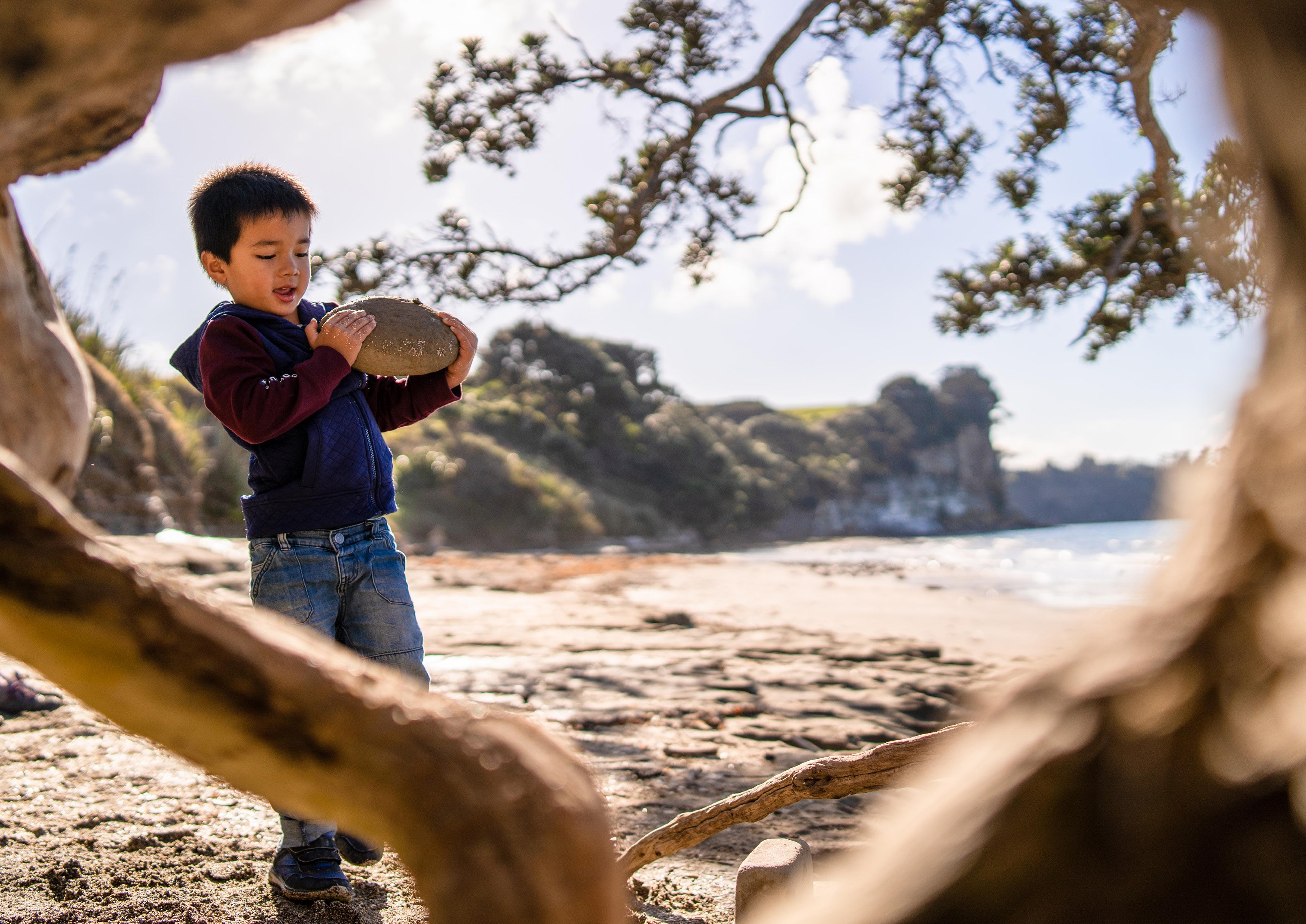
Pūrongo
CORE CORE Reports
October
He Tāpaetanga
nā
Back From Matariki 2021 to Matariki 2022
2022
Ehara taku toa i te toa takitahi, engari, he toa takitini
My strength is not the strength of one, it is the strength of many
A fai ia vave e o’o i lou va’a alo na’o oe. Ai fia tuli mamao lou va’a i le taunu’uga tatou aloalo fa’atasi
If you want to go fast go alone, but if you want to go far go together
 He Tāpaetanga Pūrongo nā CORE CORE Reports Back
He Tāpaetanga Pūrongo nā CORE CORE Reports Back
2

Inside Kia ora from Michaela and Hana 4 Together we can turn the equity dial 5 What we’ve learned from you 6 CORE’s charitable purpose 7 An equity kaupapa 8 Challenging barriers 9 Transitioning to school and kura from early years settings Destreaming Ko tātou tēnei Supporting accessibility 13 uLearn 21 and 22 Hybrid learning Online field trips Confronting racism and unconscious bias 17 Facilitating challenging conversations Collaborating on action research 19 Getting to the source Thank you for your commitment to equity through learning! 21
3
He Tāpaetanga Pūrongo nā CORE | CORE Reports Back
Kia ora from CORE Education
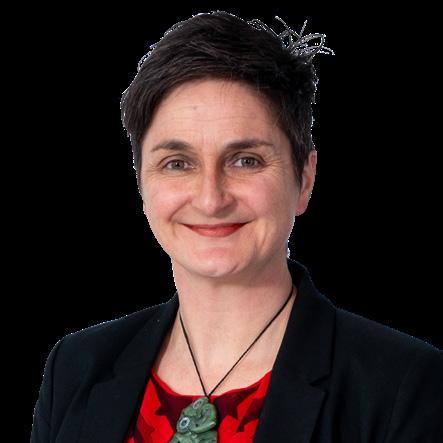
We’re really happy to share highlights from mid-2021 to mid-2022 in He Tāpaetanga Pūrongo nā CORE, our first report back to the communities we serve.


Over this time you have invited us to work alongside you in many different ways on joint kaupapa that’s about doing the best for tamariki and rangatahi.
We’ve learned so much from you.
The stories in our report shine a light on some of the impactful work you’re involved with across Aotearoa that CORE has been a part of.
Thank you for your absolute commitment to system transformation. Together we can work for long-lasting change that supports the most vulnerable learners in our country to thrive.
Dr Hana O’Regan
Tumu Whakarae
Michaela Blacklock Chair of the Board
4
He Tāpaetanga Pūrongo nā CORE CORE Reports Back
Together, we can turn the equity dial
Thriving as a learner depends on having equitable access to opportunities.

Turning the equity dial for learners means large numbers of people and organisations in Aotearoa working together to take action.
Thousands of centres, schools, kura, businesses, and organisations are already doing this. CORE has been fortunate to work with some of you on your equity journey this year.
1000 centres, schools, and kura 19 delivery partners 18 government entities 9 iwi 6 communities and organisations 5 not for profits 7 funding partners 4 corporates 3 universities
Tāpaetanga Pūrongo nā CORE | CORE Reports Back 5
He
What we’ve learned from you
Implementing long term change that supports ākonga to thrive as learners, regardless of who they are, where they live, or the challenges they face is complex and deep – but ultimately transformational.
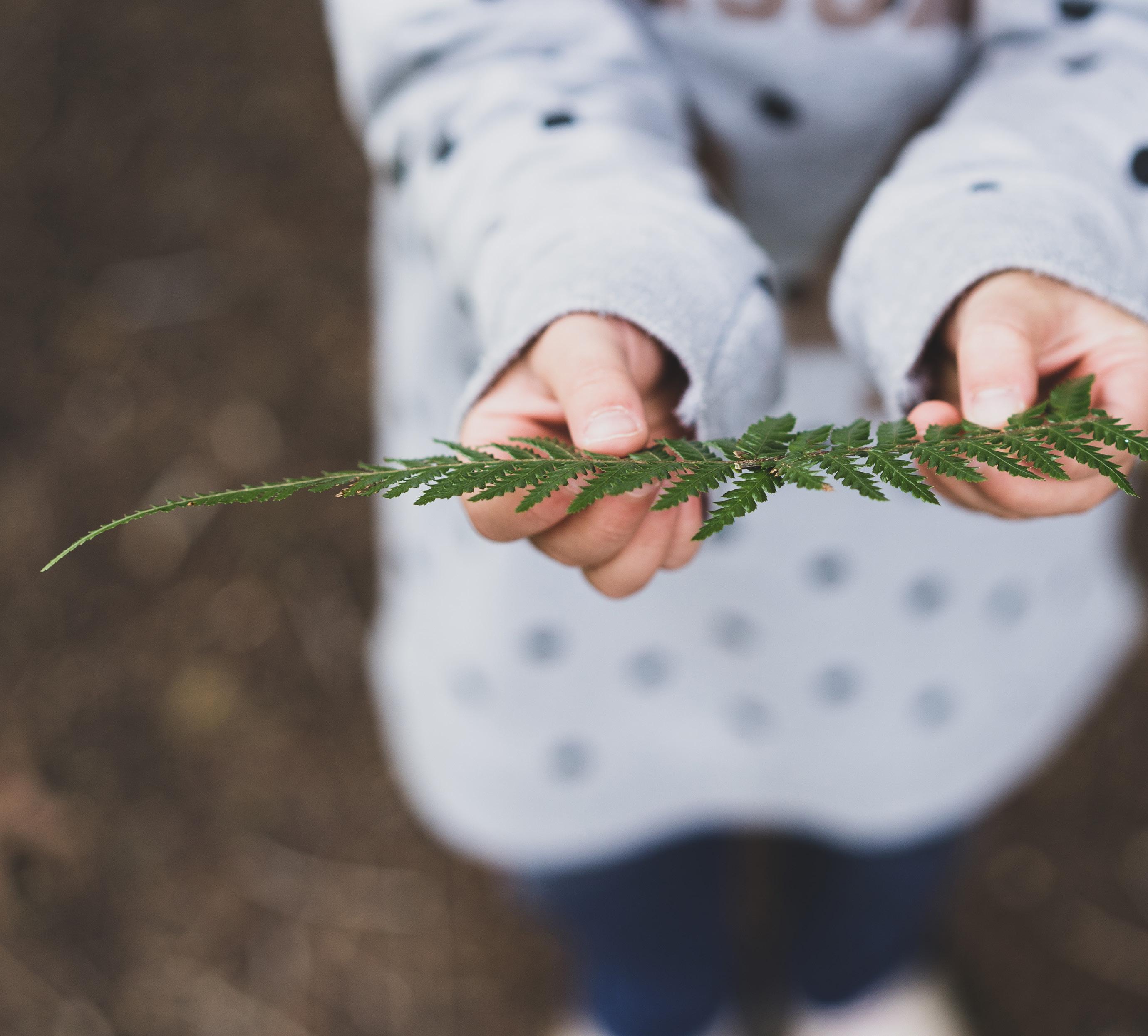
It’s a journey many of you are on, and it’s also at the heart of what we do at CORE.
Where we’ve had the privilege to be on this journey with you:
You’ve shown us the importance of Treading lightly Standing alongside Deeply understanding
We’ve learned that Systemic inequities take effort to address Together is better than alone Co-design is better than a predetermined solution
Many people don’t “see” inequity if they are not directly impacted
6
He Tāpaetanga Pūrongo nā CORE CORE Reports
Back
CORE’s charitable purpose

Some of the equity-focused mahi we’ve worked with you on this year has been funded by incredible organisations. This has allowed us to do work alongside communities that often draw the short straw.
The focus of our equity work is shaped by our charitable purpose – to advance education – we do this through:
Research
Our equity work is evidence-based. We learn from and with you – the communities we serve – and aim to return insights and data to you that may support your development, your impact, and the decisions you make.
Resources
We work alongside you and your communities, using co-design approaches, to create resources that support and extend the impact of your own equityfocused mahi.
Learning environments
We are committed to supporting you to shape environments for learning that are Tiritihonouring, equitable, inclusive and respectful. The languages, cultures and identities of your communities determine how we respond to the learning needs you identify.
Technology
Access to technology can make learning more equitable, so we use it to support and extend opportunities for learning into your communities.
| CORE Reports Back 7
He Tāpaetanga Pūrongo nā
CORE
An equity kaupapa
While some of our priorities have changed over the almost 20 years we’ve existed, CORE has always been a Tiriti-honouring organisation focused on success for all learners.
In the last few years we’ve worked on understanding the barriers and acting on the inequities faced by some learners that prevent them from thriving. For example, we know that Māori and Pacific learners have to navigate systems that are not designed with them in mind, and this is a particular area of action for us.
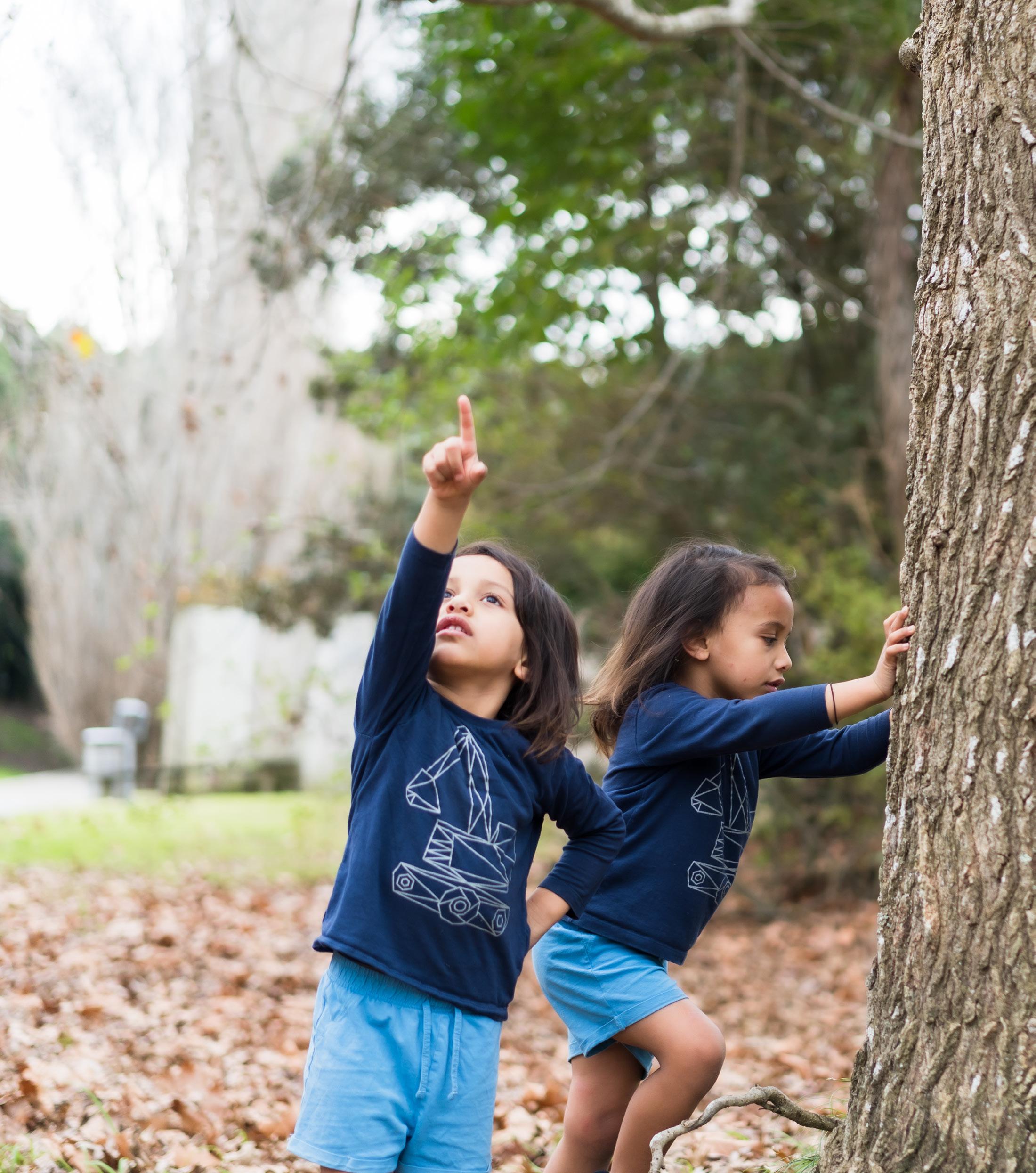
We seek to serve and act as partners or allies with organisations who work directly with those who sit at the margins – this includes support for those with a disability, those who learn differently, those who ‘look and sound’ different because they are from other countries, and those who face racism, bullying, discrimination simply for being who they are.
Seeking to address the inequities many learners face is our kaupapa and shapes the mahi that we do with you.
On the next pages you can see stories about some of the equity-focused work you have invited us to be involved with over the last year. Most of this work is ongoing. That’s the thing about kaupapa that is about transforming systems… it’s about staying the course.
These stories are grouped into four kaupapa:
» Challenging barriers
» Supporting accessibility
» Confronting racism and unconscious bias
» Collaborating on action research
Reports Back 8
He Tāpaetanga Pūrongo nā CORE CORE
Challenging barriers
It’s hard work to breakthrough and then demolish the barriers to equity in our education system. They are even harder to see if we’ve not directly experienced some of these barriers ourselves – barriers like being streamed into “low ability” classes, not being given the chance to take some subjects, not having access to digital tools or resources that look and feel like our own lives.
We know that transitions between learning sites are hard for many tamariki, and that there are never enough resources for kura kaupapa learners. These are enduring challenges in our system for so many.
The stories in this section cover examples of some work we’ve done alongside others to raise the flag around these issues. This has sometimes been working right in the communities who directly experience them, or acting in allyship to support others to amplify their voices on a national stage.
He Tāpaetanga Pūrongo nā CORE | CORE Reports Back 9
Transitioning to school and kura from early years settings
Supporting belonging, wellbeing and engagement
Over the last few years our funding partner, Rātā Foundation, resourced CORE to lead three strands of action research to look at why some tamariki face barriers when they transition from early years settings to school or kura. The strands cover settings where the main language is English (concluded in 2021), settings where the main language is te reo Māori (concluded in 2022), and transition from settings where there are a variety of Pacific languages (ongoing).
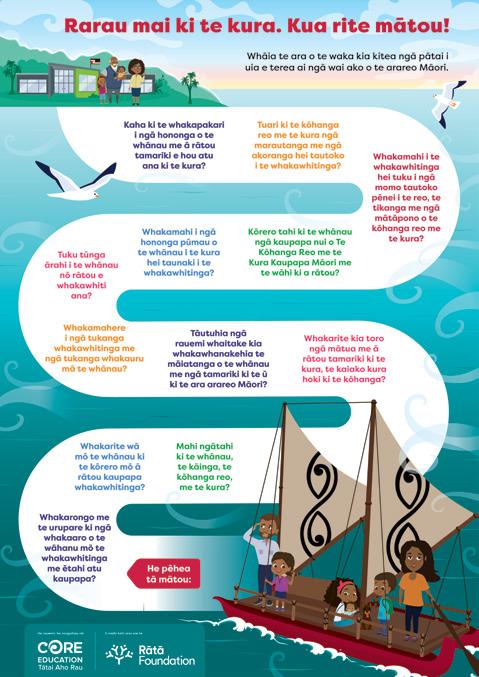

You might have been one of the teachers, whānau members, or children in Ōtautahi who shared experiences from which the findings of this research are drawn. Across all language groups you told us that a successful transition makes a huge difference to your children.
It gives them a sense of belonging, wellbeing and engagement in their new learning community.

Your stories about the challenges or successes of making a move between learning settings have given other teachers and parents important insights into how they can prepare children to make the move, and what schools and kura can do to help our youngest learners settle in.
You can look at the stories, reports, videos, and resources from this mahi on the CORE website.
English medium
Māori medium
Pacific (coming in 2023)
Focus Research Learning environments
He Tāpaetanga Pūrongo nā CORE CORE Reports Back 10
Funding partner – Rātā Foundation
Destreaming Challenging a practice that harms students and limits their learning
Focus
Resources
Research
Many of us may have been disadvantaged by being grouped, or ‘streamed’, at school according to what teachers perceived as our abilities. Last year Tokona Te Raki – Māori Futures Collective – released a report called Ending Streaming In Aotearoa research, the report shared how streaming is harmful for learners especially if they are Māori or Pacific.
It’s clear from this, and other research in the area, that in schools where streaming occurs the “bottom” streams have a disproportionate number of Māori and Pacific learners. When learners are streamed, teachers have low expectations of them. This impacts their wellbeing, limits the way they think about themselves, and keeps horizons low in terms of future opportunities. It perpetuates inequity.
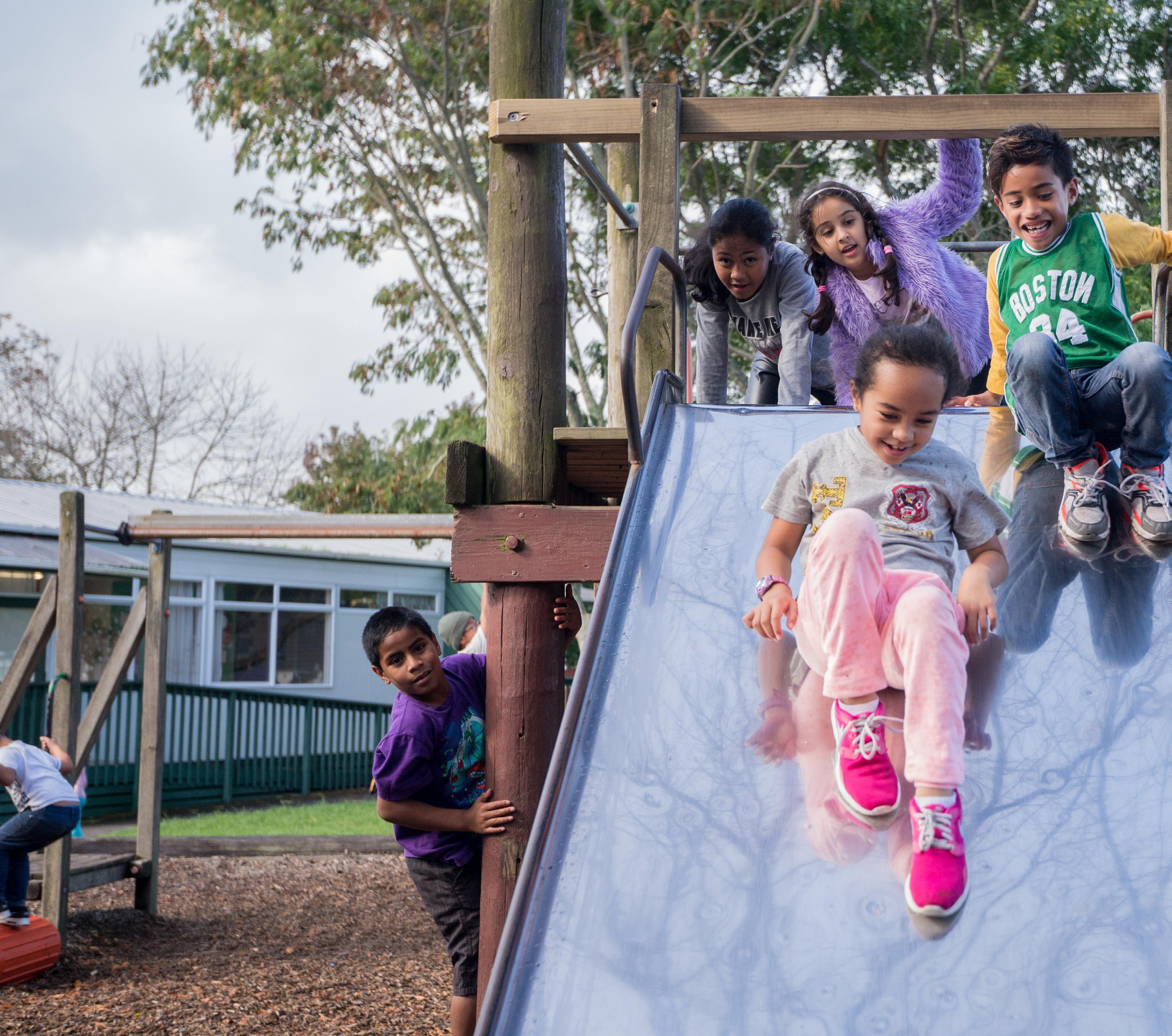
Allyship and collaboration –
Reports Back 11
He Tāpaetanga Pūrongo nā CORE | CORE
Ko tātou tēnei Rangatahi takatāpui tell their stories
Focus Research Learning environments
Resources
Rangatahi takatāpui (young Māori that are part of the LGBTQIA+ community) have powerful pūrākau (stories) to tell. These pūrākau have the potential to shape our education system in ways that are inclusive, life-affirming, and that enable rangatahi takatāpui to assert their identity as tangata whenua.
In 2020 a group of rangatahi takatāpui met and worked with CORE to share their stories and create a resource for educators and whānau that could change schools for the better. The result, in 2021, was a piece of
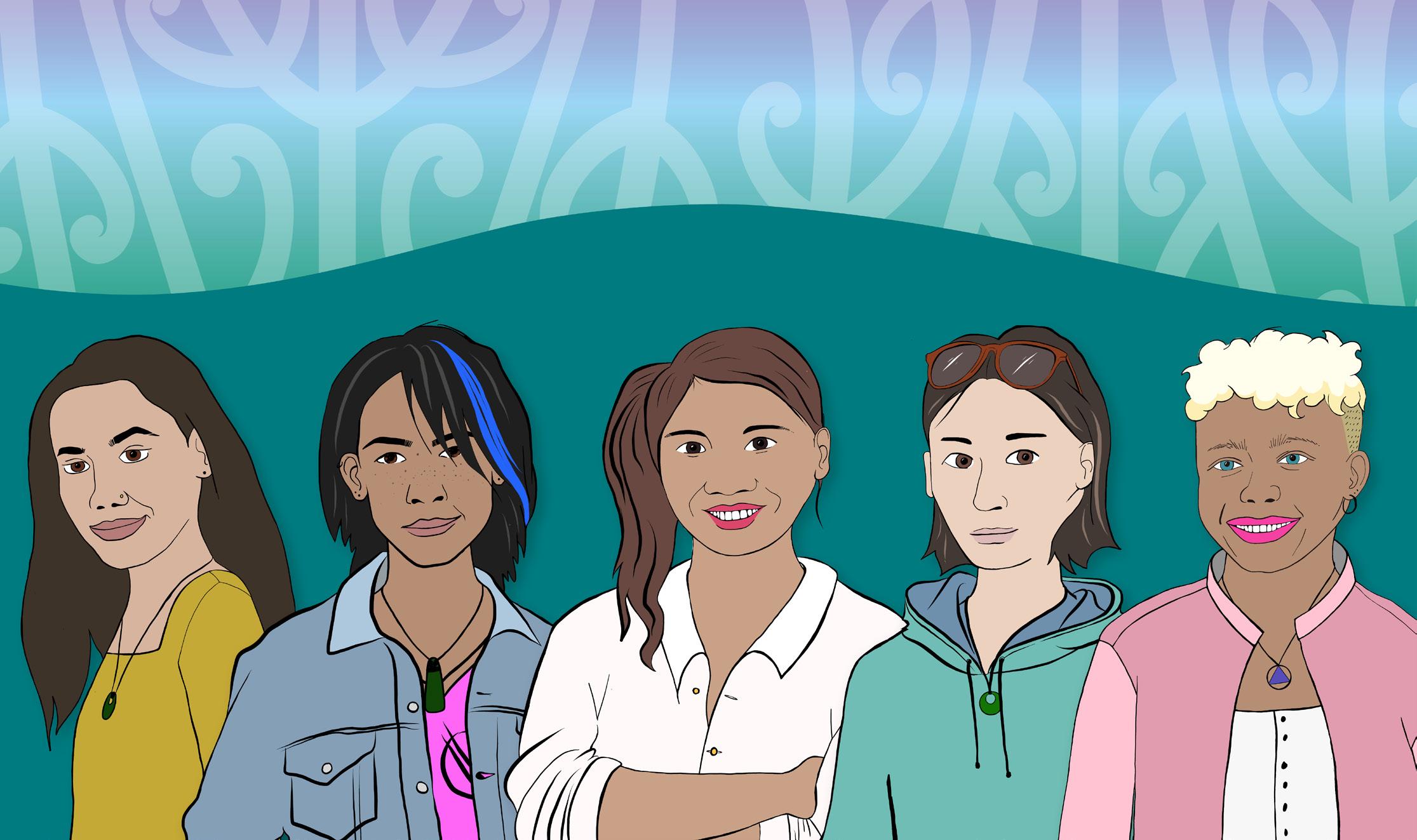
collaborative action research, Ko tātou tēnei.
At a three-day residential wānanga attended by a host of community supporters, the rangatahi shared stories that were authentic, eye-opening, and powerfully positive. Their pūrākau are how they defined and redefined themselves, and the research that captures them continues to contribute to a well-overdue kōrero across the motu about takatāpui connection and relationships, identity, knowledge, history, leadership and selfdetermination. The rangatahi collaborated in the research throughout, including shaping the
outcomes. Those involved were able to share the findings, the stories, and the resources they made with us back into their communities.
If you’re a teacher, leader, or anyone that makes decisions that affect the school lives of rangatahi takatāpui, the research, and support materials were created for you. You can access it all here:
Ko tātou tēnei
CORE’s pro bono research fund
He Tāpaetanga
CORE Reports Back 12
Pūrongo nā CORE
Supporting accessibility
Access to quality learning opportunities and resources remains a significant barrier for many learners and teachers, especially those who live away from the main centres in Aotearoa. Ease of access has been especially impacted over the years of the pandemic. These stories describe some of the initiatives we have taken at CORE in the last year to bring opportunities and resources a little closer to your communities.
13
He Tāpaetanga Pūrongo nā CORE | CORE Reports Back
Virtual uLearn
Taking a conference online
Focus Technology Resources
uLearn is an annual professional learning conference for educators. Designed and delivered by CORE, it has been a key face-to-face professional learning opportunity for thousands of them over 17 years.
Although we had planned to deliver a big refreshed uLearn for 2020, the COVID-19 pandemic had other ideas. We had to cancel the faceto-face event. We were concerned, though, about what might be lost from the teacher professional learning landscape, and the consequence for learners, if we cancelled altogether. With support from our Board, we redesigned uLearn as a virtual two-day event and delivered it online over 2020-2022. Virtual uLearn meant that teachers who were locked down could engage with key curriculum kaupapa, engage with thought leaders from Aotearoa, and share thinking about teaching and learning with colleagues from their own living rooms. While there was a registration fee to attend, we were able to subsidise, or make completely free, registrations for some schools for whom cost was a barrier.
uLearn22 was planned in partnership with EPIT, and made possible by funding from the Hugh Green Foundation, Wayne Francis Trust, and the Gattung Foundation (for the SHE programme). The funding has made supported attendance available to greater numbers.
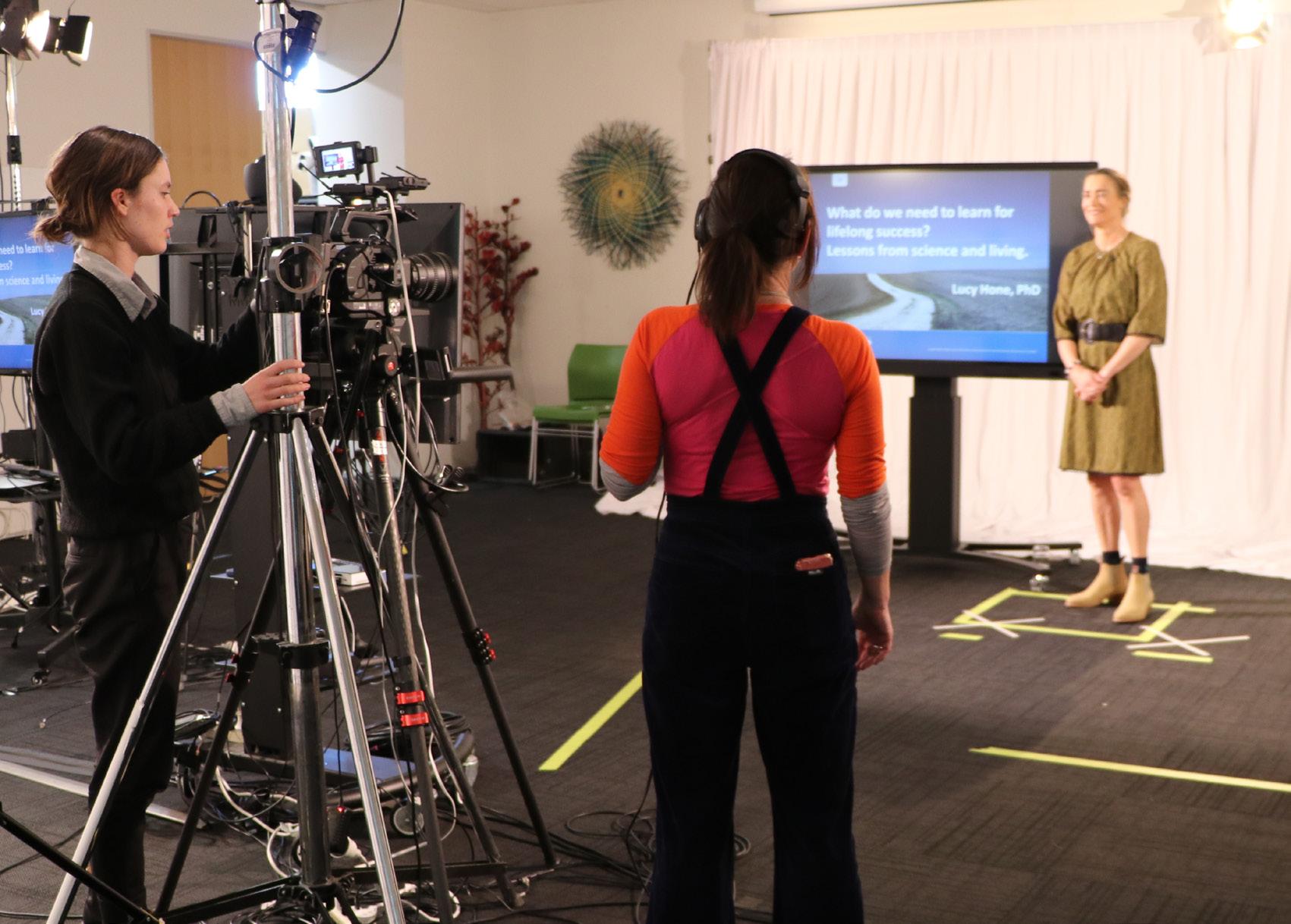
Taking uLearn online allowed us to focus on delivering a conference that was highly accessible via the internet to most learning environments and communities across the motu. Each virtual uLearn featured te reo Māori, English and New Zealand Sign Language (NZSL). NZSL was available to our livestream channel over the two days, and in 2022 NZSL in te reo was added for some sessions.
uLearn on demand, for those who could not make the two-day sessions, and those who want to rewind their learning, is accessible on the conference platform for three months after each conference.
Philanthropic partnership, collaboration and allyship
Education Partnership and Innovation Trust (EPIT)
He Tāpaetanga Pūrongo nā CORE CORE Reports Back 14
CORE-funded free webinars for teachers
Te Ako ā-Mangarau Hybrid learning
Supporting educators to teach differently in response to COVID
Focus Technology Resources
For many educators, 2022 was a significantly challenging chapter. After a year of intermittent lockdowns, disrupted plans, and a high toll on wellbeing in 2021, the issue remained that for the short-to mid-term future, significant numbers of ākonga and educators were going to be unable to physically attend a regular setting – either as a result of contracting COVID-19, or while self-isolating. As the year began, educators around the country planned for another year of working and learning both on and off site. The workforce’s collective energy reserves had taken a pummelling, yet we knew that the year ahead was likely to be no less disruptive, and we all wanted the best for our ākonga.
In response, CORE Education partnered with Derek Wenmoth of FutureMakers to offer support in the form of free webinars and resources called Te Ako ā-Mangarau – the coming together (confluence) of many rivers –a metaphor that acknowledged the multiple ways that teaching and learning would converge in settings using hybrid approaches.
Over 1,000 people registered for the webinars. The participants represented 360 education settings from throughout Aotearoa – early years, primary, intermediate, secondary, and kura kaupapa Māori settings. Our attendees told us they felt encouraged to focus on what really mattered, to build on the good work
they were doing already, to use the supports available and to co-design proactive action plans within their settings.
Te Ako ā-Mangarau provided an understanding of how to be ready for learning to happen at home and in-class at the same time, and supported a large audience with ensuring all staff and ākonga can continue engaging in teaching and learning, wherever they were located. The recordings and resources remain live, and you can access them all here:
Te Ako ā-Mangarau | Hybrid learning

| CORE Reports Back 15
He
Tāpaetanga Pūrongo nā CORE
Online field trips Making the inaccessible, accessible Focus Technology
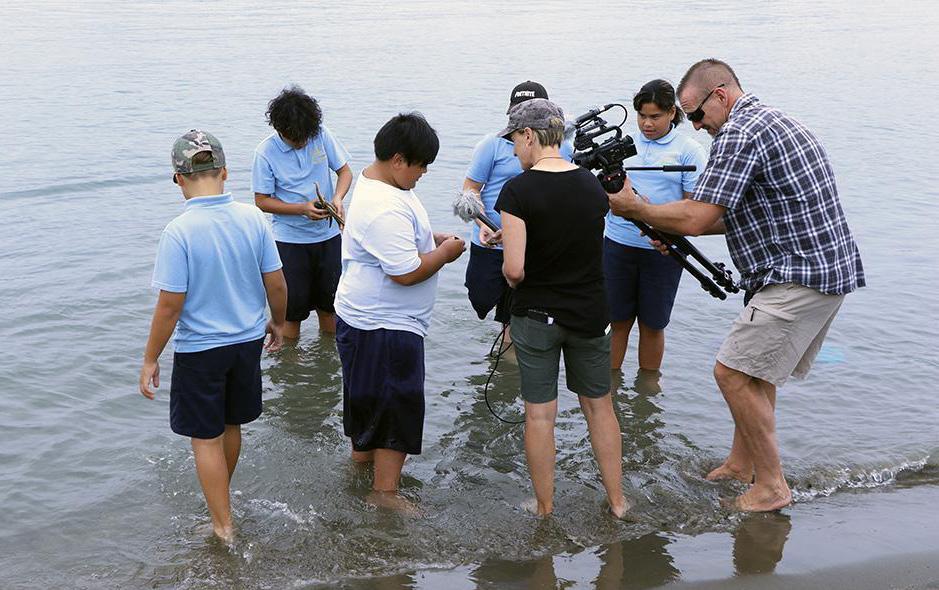
Learning environments
Stats highlights from Te Tapa Whenua Online Field Trip (week of 31 January 2022)
Access to digital technologies can help tamariki to ‘visit’ places they would never otherwise have a chance to see. Shaping the access so that visits are meaningful, connected to their lives, and support curriculum learning is the job of CORE’s LEARNZ team (two teachers, one camera!) who deliver online field trips for schools and kura across the country. The LEARNZ teachers get behind the scenes, providing access to amazing locations, events, people often bringing local tamariki in to take part.
The field trips are delivered with partner organisations, so they are free for all who sign up. For example:
• going to Antarctica (with Antarctica New Zealand)
• going underground in Auckland (with City Rail Link), and
• soaking up the creative energies backstage at The Magic Flute (with Opera New Zealand)
The Te Tapa Whenua (the naming of the land) trip this year was a collaboration between Ngai Tahu, CORE and the Ministry of Education. It took learners from all over the motu to Aoraki Mount Cook National Park to explore the naming of the land with Tā Tipene O’Regan. Place names are important landmarks of the whakapapa, culture and identity of Aotearoa and the communities within it. Before Māori language was written down, tapa whenua helped to record history and define relationships between people and the land. These place names tell stories of creation myths, ancestors, explorers, notable events, as well as describe landscape features and resources.
Multiple funding and delivery partners Resources
Canterbury 34.7% Auckland 14.8% Manawatu 4.6% Bay of Plenty 4.2% West Coast 2.3% Marlborough 2.3% Hawkes Bay 2.3% Southland 1.9% Waikato 7.4% Northland 5.1% Otago 8.8% Wellington 7.9%
8,298 learners enrolled by 264 teachers
He Tāpaetanga Pūrongo nā CORE CORE Reports Back 16
Confronting racism and unconscious bias
Many learning settings and organisations are picking up the wero to look at their relationship with te ao Māori. For example, what does it mean for us to live in a bicultural country and society? How are we giving effect to Te Tiriti in our places of work?
He Tāpaetanga Pūrongo nā CORE | CORE Reports Back
17
Facilitating challenging conversations
Focus Learning environments
More and more learning settings, businesses and other organisations across Aotearoa are showing an increasing awareness of the need to examine their equity practices. They want to build their cultural competence as part of that journey. A strong starting place for these conversations is building knowledge and understanding around Te Tiriti o Waitangi.
Opening up these conversations is important and hard – especially when the conversations challenge our worldviews, and beliefs. We do not always recognise our privileges if the status quo advantages us. Bias can be unconscious.
Over the last year CORE facilitators have supported complex conversations like this in learning settings and businesses. Many settings are seeking support like this as they embark on implementing the Aotearoa New Zealand Histories curriculum. The work is detailed, challenging, yet rewarding for all
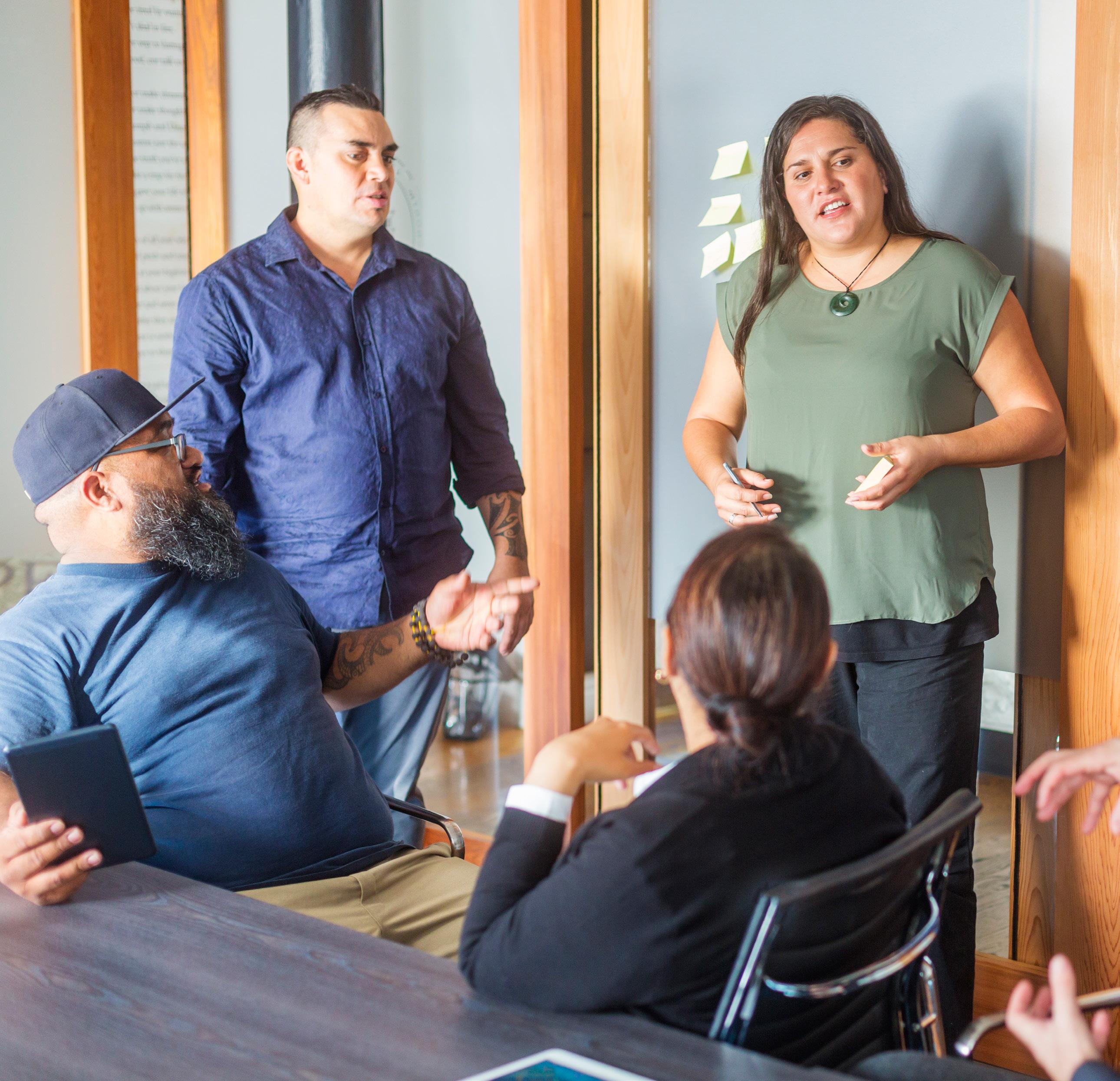
CORE Reports Back 18
He Tāpaetanga Pūrongo nā CORE
Collaborating on action research
Action research is about being curious about what’s happening in your learning setting, and posing questions like “Why do some things that I do work for some learners but not others?” The research part is about searching for answers to these questions. Action research is community-based, often community-led, and always about collaborating.
If you’re an educator doing action research you’ll start with a question, you’ll collaborate with your learners and other teachers, and engage with whānau to answer it. You will look for patterns, get insights through the stories your communities tell, and try different strategies to identify what could change so that all your learners thrive.
19
He Tāpaetanga Pūrongo nā CORE | CORE Reports Back
Multiple funders and communities
Getting to the source
Community-based action research
Focus Learning environments
Research
Over the last year CORE research kaimahi have collaborated with a number of communities on action research projects. Two that we have completed are:
• the Rātā-funded transitions research with educators and whānau in early years settings outlined on p.10
• CORE-funded research with rainbow rangatahi, Ko tātou tēnei, outlined on p.12
Two other community-led action research projects are ongoing. We were invited by Te Puna Mātauranga o Whanganui, the education entity of Whanganui iwi, to support them to look at the question – Kei te pehea aku mokopuna? How are my mokopuna doing?
Supported by funding from the Lotteries Commission, it brings together the voices of tamariki, rangatahi, whānau and educators in joint community conversations to talk about their experiences of streaming at school and its impact on learning. We’re already looking forward to sharing the findings from this research back to the communities so that they can plan how they will move forward together on the research question.
The second project, being undertaken in collaboration with the University of Canterbury, is focused on an equity issue around oral communication for young learners. From other research we’ve supported in this area we already know that ease of access to expertise in speech therapy is hard to come by for

early learning services, schools and whānau. The Education Partnership and Innovation Trust (EPIT) is funding action research around trialling a simple but effective online tool that helps teachers to identify potential communication challenges for tamariki, and strategies to address them. The tool democratises the expert knowledge usually required to make these assessments, and makes it easy for whānau and kaiako to use as a first step to identifying possible concerns.
Many of you are currently involved in these community-led research projects. You are helping to shift the dial on these enduring inequities.
He Tāpaetanga Pūrongo nā CORE CORE Reports Back 20
Thank you for your commitment to equity through learning!
Iwi
Hokotehi Trust (Moriori)
Ngāi Tahu
Ngāi Tamarāwaho
Ngāi Tūāhuriri
Ngāti Awa
Ngāti Hinewaka
Ngāti Mutunga o Wharekauri
Ngāti Toa Rangatira
Te Akitai
Services to government
Accident Compensation Corporation
Auckland Art Gallery
Auckland Council
Auckland Libraries
Fire and Emergency New Zealand (FENZ)
Institute of Judicial Studies
Ministry of Education
Ministry of Justice
National Emergency Management Agency
NIWA
Office of the Auditor General Oranga Tamariki
Public Defence Service Sports NZ
Te Ara Ahunga Ora Retirement Commission
Te Taura Whiri Māori Language Commission
Te Tumu Paeroa – Office of the Māori Trustee Waka Kotahi

Delivery partners
Cawthron Institute
Department of Conservation Environment Canterbury
Grow Waitaha Alliance Partners
Herenga ā Nuku Aotearoa – Walking Access Commission
Heritage New Zealand Hokonui Rūnanga
InspirED ECE
KiwiRail Lift Education Living by the Stars
Funding partners
Education Partnership and Innovation Trust (EPIT)
Hugh Green Foundation
Lindsay Foundation
Rātā Foundation
The Gattung Foundation
Wayne Francis Trust Lotteries Commission
Ministry for Culture and Heritage New Zealand Institute of Wellbeing and Resilience (NZIWR)
SAASIA, Sosaiete Aoga Amata Samoa i Aotearoa
SEEDS Samoana Education Development Services
Tārai Kura Alliance
Te Araroa Trust
Te Roroa
Toitū te Whenua - Land Information New Zealand
Toka Tū Ake EQC
He Tāpaetanga Pūrongo nā
| CORE Reports Back 21
CORE
Communities and organisations
Ko Taku Reo – Deaf Education New Zealand
Members of the Muslim community of Ōtautahi
New Zealand Council for Educational Research
Rangatahi from the Rainbow Community of Ōtautahi

Te Puna Mātauranga o Whanganui Charitable Trust
Tokona Te Raki
Not for profits
Graeme Dingle Foundation
Para Kore
St John
Story Time Foundation
The Peace Foundation
Universities
Massey University
University of Canterbury
Waikato University
Corporate clients
ANZCO Foods
Grok Academy
MVH Water Water Care
22
He Tāpaetanga Pūrongo nā CORE CORE Reports Back
www.core-ed.org

 He Tāpaetanga Pūrongo nā CORE CORE Reports Back
He Tāpaetanga Pūrongo nā CORE CORE Reports Back




















